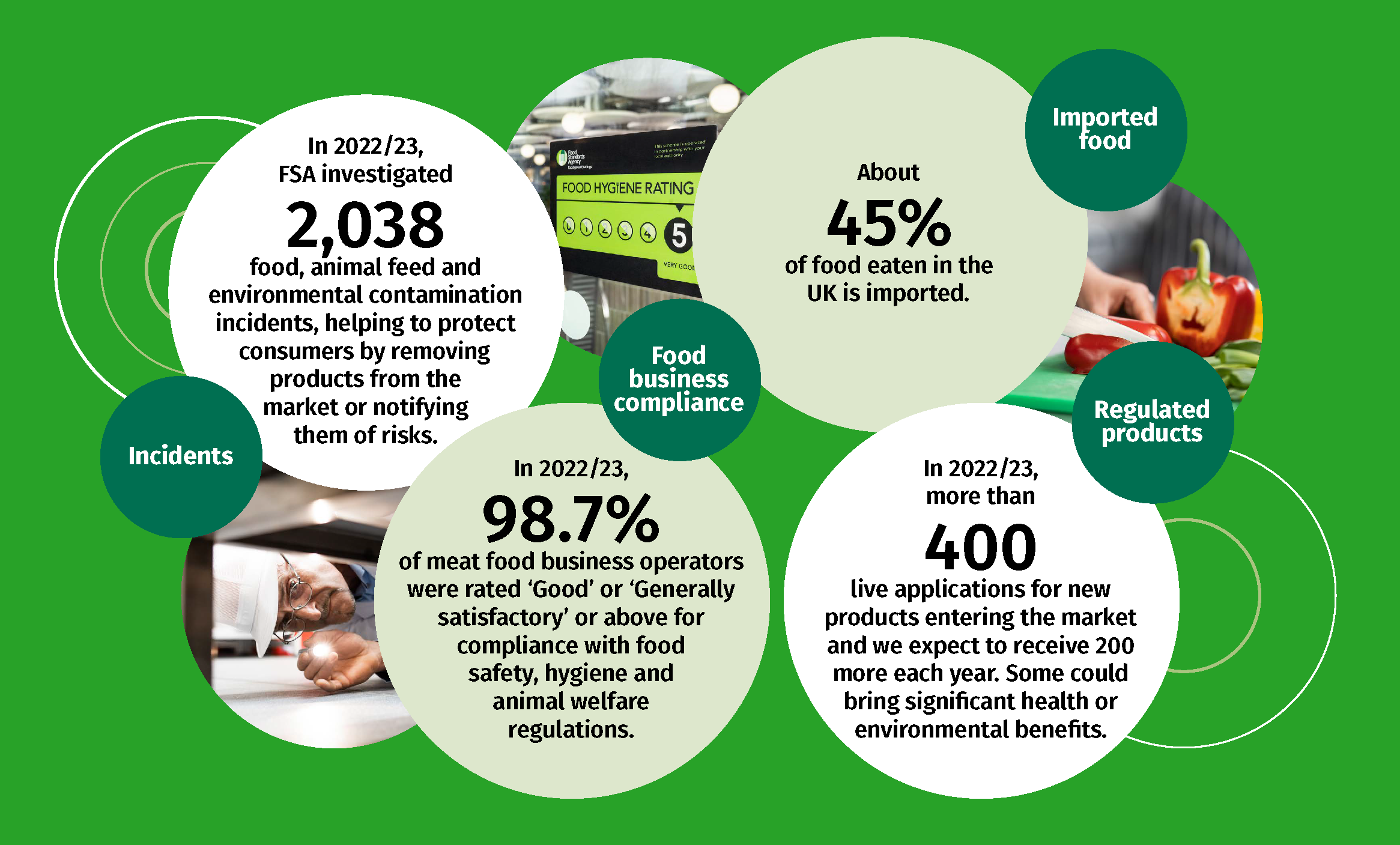What we do
From policy making to evidence generating and regulating, here’s what we do to keep food safe.
We are an evidence generator
We have a global reputation for science and research. From the rapid assessment of risks to consumer safety, to developing new surveillance techniques to identify risks more quickly, to understanding consumer values, attitudes and behaviours.
We publish our evidence in line with our commitment to transparency. This means it is freely available to others making policy and decisions, to inform guidance to businesses and so the public can trust our decisions. We are also responsible for designating the official laboratories that carry out important chemical and compositional analyses on food and feed samples taken by local authorities or port health authorities.
We are a policy maker
We advise ministers on food safety, food authenticity and consumer interests in relation to food in England, Wales and Northern Ireland.
The policy areas we advise on are different in each nation, please see our food regulatory system page for more information on this. This is underpinned by risk assessments of new developments and using science and evidence.
Now that the UK has left the EU, we make recommendations to ministers about which food and feed products should be authorised for sale on the market in Great Britain and advise on the implications of regulatory changes in Northern Ireland.
We, with Food Standards Scotland, carry out risk analysis for these regulated products and provide advice to ministers, who decide whether the product can be placed on the market in England, Wales and Scotland. We also support the government’s work on trade opportunities for the UK, by providing risk assessments of countries that want to start importing to the UK and demonstrating our own food safety arrangements to countries we export to. We provide policy advice to support delivery of effective and risk-based official controls – these are inspections, audits and surveillance, sampling in food businesses.
Following the Retained EU Law (Revocation and Reform) Act 2023, we review pieces of Retained EU Law (REUL) in our remit in England, Wales and Northern Ireland with a view to reforming regulations. This to create a proportionate, effective, efficient and future focused approach to regulation through the risk analysis process and regulated products service, that protects consumers and removes barriers to innovation. We are developing a new regulatory regime for precision bred food and feed.

We are a regulator
We regulate the food system in England, Wales and Northern Ireland.
We directly deliver controls in meat, primary dairy and wine production.
FSA staff and veterinary contractors inspect, audit and assure businesses, including the signing of export health certificates. We work with local authorities who inspect local businesses selling food – setting the inspection framework, providing advice and guidance. We do the same for port health authorities, who inspect food imports. We are reforming the food safety regulatory framework to deliver more proportionate and risk-based assurance.
We provide guidance to food businesses. We use surveillance to identify risks to consumers and spot potential food safety incidents, and we respond to these when they happen. This includes working with manufacturers, retailers and local authorities to trace sources of outbreaks of foodborne disease and co-ordinate action such as product recalls to protect consumers and businesses.
Our National Food Crime Unit works to tackle serious fraud and related criminality in food supply chains – and we are the process of securing enhanced powers to support investigations.
We are a watchdog
We review and report on food standards and consumer interests in relation to food, using horizon scanning, intelligence and surveillance. We, with Food Standards Scotland, publish an annual review of food standards across the UK.
We speak out publicly about areas of consumer interest, when we have evidence or expertise that could make a difference. This includes providing advice to ministers on whether Free Trade Agreements maintain statutory protections for human health to support reports produced for the UK Parliament under Section 42 of the Agriculture Act 2020, and separately we provide advice to ministers on requests to access our markets for specific commodities.
We are a convenor and collaborator
Food is a devolved matter. We work closely with other departments in UK Government, the Welsh Government and the Northern Ireland Executive, and with Food Standards Scotland, to deliver shared priorities and ensure consumer interests in food are represented. This includes our work on the Government’s Border Target Operating Model for import controls and the Windsor Framework for trade between Great Britain and Northern Ireland.
We are committed to cross government working to seek consensus on the advice we provide to ministers in each country. This includes participating in Common Frameworks – these are cross government processes that ensure a common approach is taken in devolved policy areas.
We also bring together other parties to address issues in the food system, working with academia, civil society and businesses to support shared goals and objectives. We share insights and evidence on the interests of citizens to help inform thinking across government.
See Our Partnerships for more information about how we work with others, including on School Food Standards.